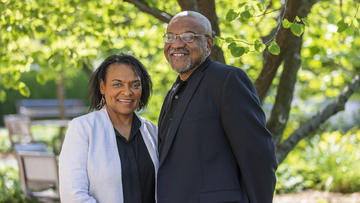
Craig Chandler, University Communication
Professor Elleke Boehmer, former TORCH Director and Professor of World Literature in the English Faculty, and Lucy McCann, Bodleian Libraries Senior Archivist, are both involved as investigators in the international African Poetry Digital Portal project, based at the University of Nebraska, which has just been awarded an Andrew W. Mellon Foundation award of $750,000 for three years.
This multi-institution project is led by Kwame Dawes, George Holmes, Distinguished Professor of English, Glenna Luschei, Editor of Prairie Schooner, and Lorna Dawes, Associate Professor, University Libraries.
Initially established in 2017, the African Poetry Digital Portal documents the work of African poets and provides digital access to related creative and intellectual artifacts, materials and research.
The portal project has attracted an array of partners from Africa and beyond: the University of Cape Town in South Africa, the University of Lomé in Togo and the University of Ghana; University of Oxford and Cambridge University in the United Kingdom; and Northwestern University, the University of Michigan and the Library of Congress in the United States.
The three-year Mellon Foundation grant provides support for the portal’s next phases: expanding research and scholarship relating to African poetry and joining with other institutions to create a digital collections hub that will give access to materials held by institutions worldwide. In Oxford, the funding will provide stipends to student researchers to work on technical and archival aspects of the Poetry Portal.
Professor Kwame Dawes commented: “Poets have always understood themselves to be part of an ancient tradition that dates back into antiquity. Unfortunately, racism and other forms of power dynamics have limited our understanding of the threads of this tradition in parts of the world that were exploited. The fact is that rich and sophisticated poetic practices and traditions have always existed in African societies and continue to thrive in Africa. Our work, we hope, will bring this to light and in so doing, will give poets a chance to engage this tradition as part of their understanding of poetic form and practice." He added. “It has been a tremendous honor to form partnerships with individuals from such venerable institutions from around the world.”